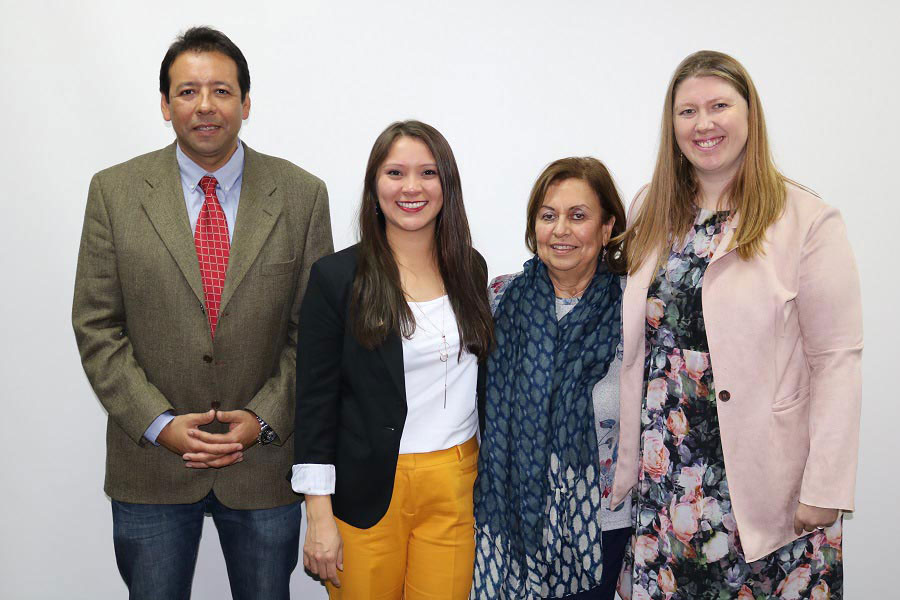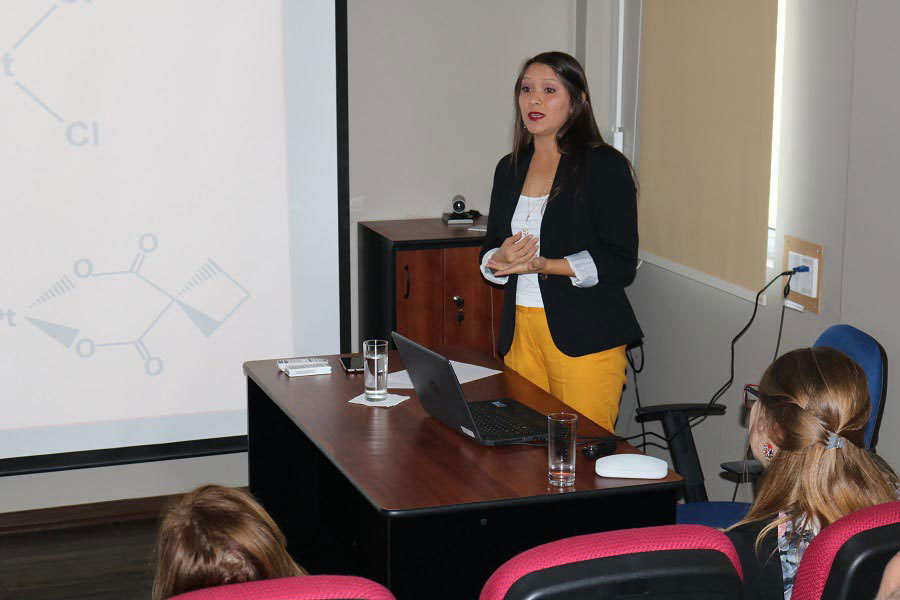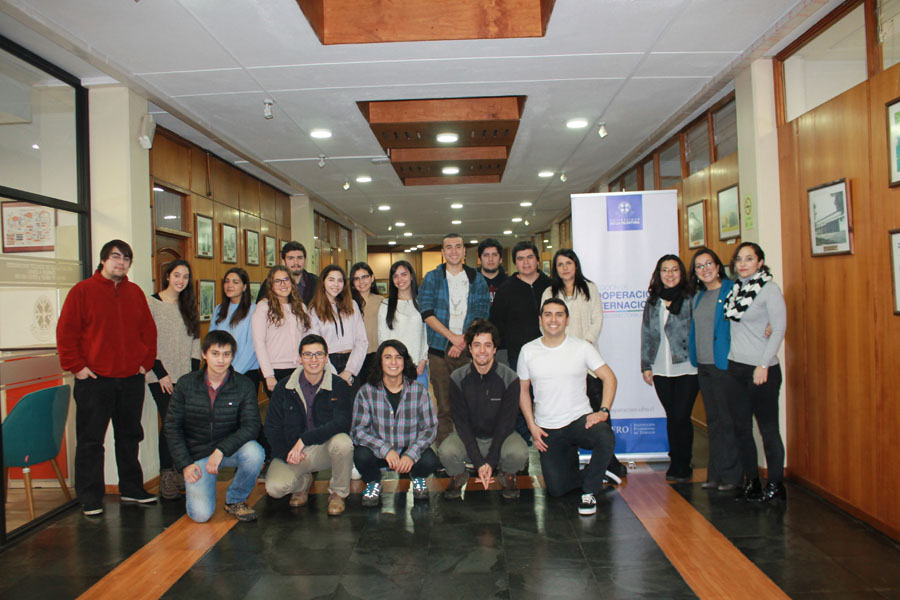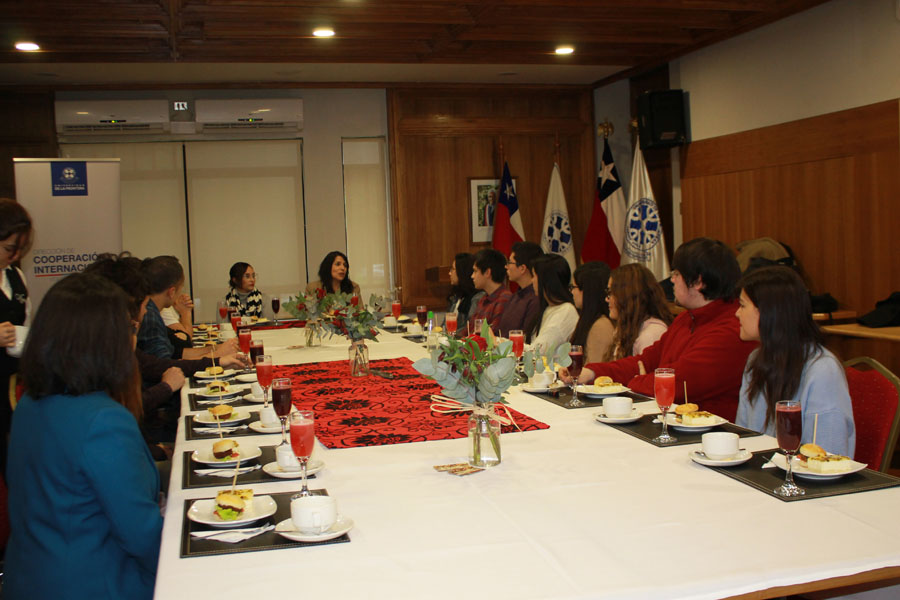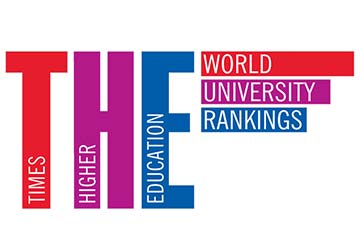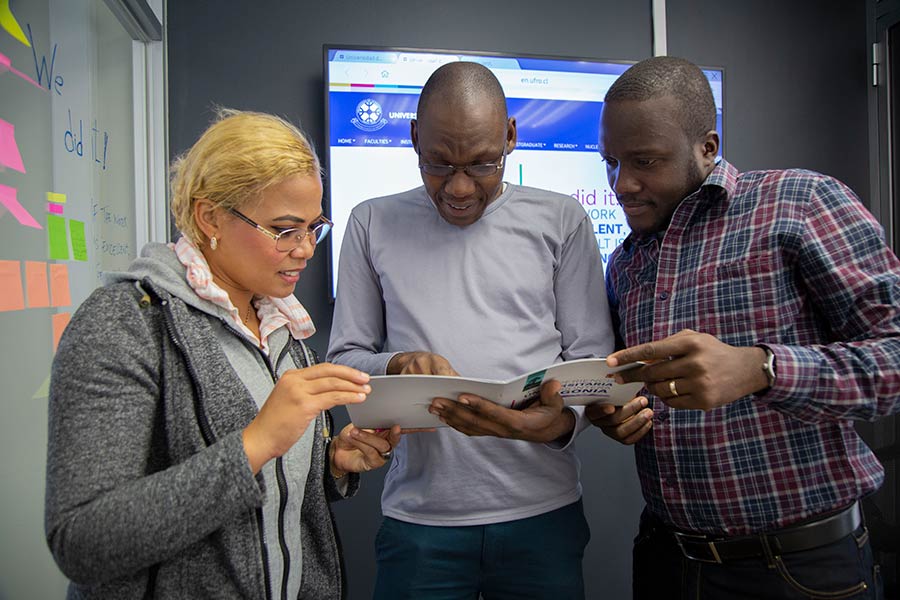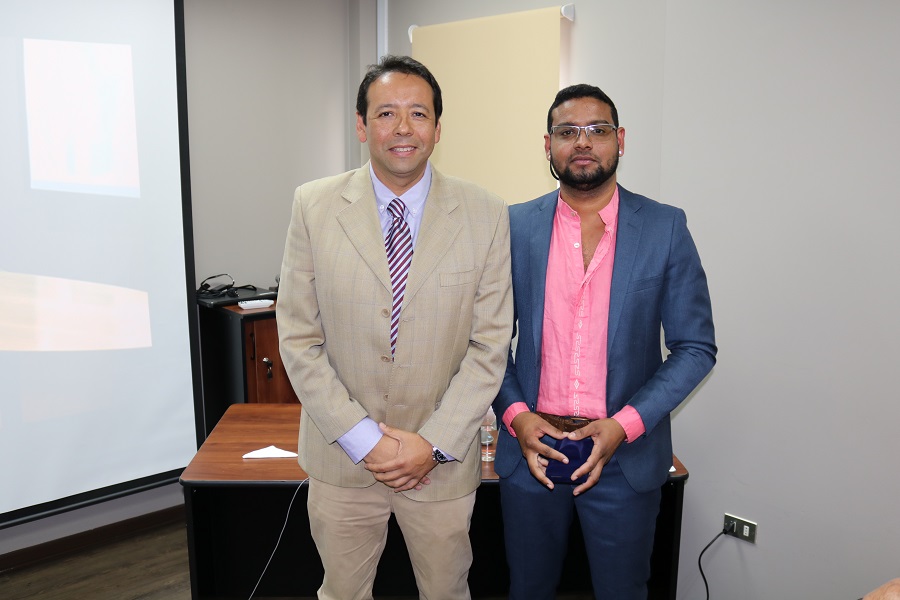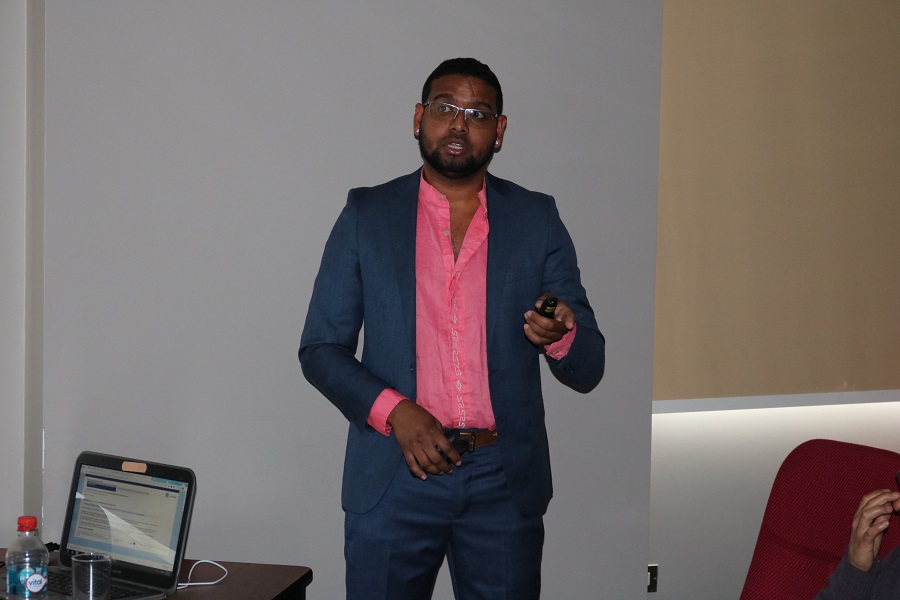UFRO Ph.D. Graduate studied genes involved in the resistance to drugs used in ovarian cancer therapy
|
The Researcher Tamara Viscarra Alvarez studied a way to sensitize cell lines and laid the basis for the introduction of a new way to treat cancer in patients that do not respond to the conventional therapies. |
Cancer is one of the main causes of death in developed countries. Carboplatin is one of the most used drugs for the treatment and one of its benefits is that there are less side effects. Although the different cancer treatments show positive effects, patients often develop resistance to chemo-therapy drugs, what reduces its effectiveness. The main objective of the research work of Tamara Viscarra Alvarez was to study the expression of genes that are associated with carboplatin in ovarian cancer cell lines as a mechanism of reversal of the resistance phenotype. This study led her to obtaining her Ph.D. degree in Sciences with specialization in Applied Cellular and Molecular Biology from the Universidad de La Frontera. “The objective of my research was to modulate the resistance to carboplatin in ovarian cancer cells. Therefore, we carried out a series of trials which allowed us to establish that the SFRP4 gene in combination with the treatment with carboplatin allows reducing the resistance in ovarian cancer cells,” Dr. Viscarra explained. One of the conclusions of the study was that, thanks to the use of carboplatin in combination with the overexpression of the SFRP4 gene, we could sensitize resistant cell lines in order to achieve a better response to the treatment with carboplatin. “Regarding the advantages the results of this study present, we will be able to reduce the side effects a lot of patients present after chemotherapy and to reduce the rates of death in patients that have to undergo a second chemotherapy since they do not work properly. Thanks to this, we can establish a new treatment, particularly for those patients who do not respond to the conventional therapies,” Dr. Viscarra added. The thesis of Dr. Viscarra was carried out in the Laboratory of Molecular Pathology of the Universidad de La Frontera, under the supervision of Dr. Priscilla Brebi Mieville. She joined the Doctoral Program in 2013, after finishing her studies in Biotechnology at the Universidad de La Frontera. “The Ph.D. Program allowed me to dream. It did not limit us to investigate one particular issue, but allowed us to evaluate all options, requirements and desires we got in scientific research and to achieve that in the best way possible. You have a lot of possibilities: you can do stays abroad and, besides, you can count on the constant support the program offers to its students,” she sustained. During the elaboration of her doctoral thesis, Dr. Viscarra achieved six publications in ISI indexed journals and two sent articles. In addition, she made 13 presentations at international congresses and 17 at national congresses.
 Written by: UFRO Communications Office Written by: UFRO Communications OfficeThis email address is being protected from spambots. You need JavaScript enabled to view it. |
|
A total of 25 young students of the UFRO are going to spend one or two semesters at prestigious international institutions for higher education. The International Affairs Office and the Student Mobility Office of the university brought them together in order to congratulate them and to get to know their expectations. |
The 25 undergraduate students of the Universidad de La Frontera (UFRO) are going to travel to countries such as Germany, Austria, Brazil, Canada, Colombia, Spain, France and Switzerland. They are all going to fulfill their dream of studying abroad in order to gain experiences in their professional training and for life, thanks to scholarship programs and international agreements. One student is also going to participate in the national student mobility program. It is key to put the main aspects for institutional internationalization into practice, opening new opportunities, not only for researchers and academics, but also for the students. On this occasion, 25 undergraduate students of the different faculties are going to do a student exchange or academic stay at prestigious European and American institutions. The director of the International Affairs Office of the Universidad de La Frontera, Dr. Berta Schnettler, pointed out: “It is absolutely necessary to support the students and their projections regarding their professional training, and therefore, we have been establishing partnerships with different higher education institutions in the world. We know that opportunities like this one stimulate the search for knowledge and the development of our human capital.” The students who are going to spend one or two semesters studying abroad are: Gabriela Flandez (Industrial Engineering (IE), specialization in Bioprocesses; Carlos Loncon (IE, specialization in Computer Science); Benjamín Raposo (Mechanical Engineering); Benjamín Quiroz (IE, specialization in Mechanics); Samia Elhafed (Business Administration); Ivana Perich (IE, specialization in Computer Engineering); Luciano Lagos (Physical Education Pedagogy); Catalina Álvarez (Social Work); Catalina Jara and Héctor Baeza (Psychology); Pamela Almeida (Sociology); Gabriel Díaz (Engineering in Natural Resources); Vicente Avilés (Agronomy); Sofía Saralegui (Law); Bastián Sáez and Sofía Tapia (Physiotherapy); Paula Espinoza, Matías Castillo, Ornela Castagnoli, Daniela Otárola and Jaime Vera (Dentistry). They are all going to participate in student mobility thanks to different scholarship programs, while four other undergraduate students – Bastián Henríquez (Civil Engineering), José Painen (Electrical Engineering), Diego Villagrán and Camilo Cuevas (Computer Engineering) – are going to Switzerland, Brazil, Austria and Colombia for internships, thanks to IAESTE. In this regard, Diego Nicolas demonstrated great enthusiasm and stated: “I am going to do my second internship at the University of Campinas in Brazil, where I am going to join the Physics Research Center and to contribute to their work in the field of software modeling related to the lifetime of particles.” The Director of the National and International Student Mobility Unit of the Universidad de La Frontera, Antonia Espinoza, confirmed the number of students who are going to spend one or two exchange semesters abroad: “We are very happy that they have the opportunity to spend some time for their studies or internships at universities abroad and in Chile. Some are going to be self-financed and some are going to go with scholarships.” In this context, she also emphasized the important support of the Canadian government, the Pacific Alliance, ELAP, Santander-scholarships, the Institute of Political Studies in Rennes and the DHBW-Ravensburg, etc.
 Written by: UFRO Communications Office Written by: UFRO Communications OfficeThis email address is being protected from spambots. You need JavaScript enabled to view it. |
|
The Ranking lists the world’s best universities that are 50 years old or younger. The UFRO is ranked in the range 201-250 at the international level, in third place among the Chilean universities and in first place among the Chilean state universities. |
This is another excellent achievement for the Universidad de La Frontera (UFRO). This time, it is ranked in the Times Higher Education (THE) Young University Rankings 2019 in the range 201-250 at the international level and in third place among Chilean universities. The Ranking lists the world’s best universities that are 50 years old or younger. This year’s ranking includes 351 universities (101 more than in 2018) in 60 countries. Seven of them are from Chile and the Universidad de La Frontera is the third best among them and in first place regarding the state universities. In this regard, the Rector Dr. Eduardo Hebel Weiss pointed out that the latest results of the THE Young University Rankings 2019 “support and highlight that the UFRO is working in the fields that make it stand out: we have ten doctoral programs, of which two are internationally accredited, what means that we attracted more than 1200 national and international students in postgraduate. Regarding research, we achieved to increase the number of WoS publications, and now, we are trying to improve the impact of them. This new awareness has served as a basis for the development of new outstanding and pertinent lines of research, since part of our interest is that our results reflect the needs of the region we live in.” He also emphasized: “When it comes to outreach and community engagement, we are committed to the challenges of the Araucanía Region and all its scopes: renewable energies, health, teaching quality, links with businesses, and so on. Definitely, being in third place in the THE ranking is the result of the responsible and solid work of our university community.” This ranking uses the same 13 performance indicators as the THE World University Rankings, but the weightings have been adjusted to give less weight to reputation, since it lists universities that are 50 years old or younger.
 Written by: UFRO Communications Office Written by: UFRO Communications OfficeThis email address is being protected from spambots. You need JavaScript enabled to view it. |
UFRO signs new double degree agreements and strengthens links with universities of excellence abroad
|
Australia, Brazil, Belgium, the Netherlands and Colombia are the countries with which the UFRO is creating or renewing its double degree agreements. |
Thanks to the signing of new double degree agreements and the renewal of the existing ones, the Universidad de La Frontera (UFRO) keeps being a leader in the training of advanced human capital in the south of Chile and achieving that its international alliances have a positive impact on its doctoral programs and research teams. Dr. Berta Schnettler, the director of the UFRO International Affairs Office, affirmed: “One of the greatest demonstrations of institutional trust between foreign universities is when they establish and maintain double degree agreements, what confirms the academic quality of the programs that are in alliance with each other. In this context, the partnerships with institutions in Australia, Brazil, Belgium and the Netherlands represent privileged relations and links with high-prestige universities around the world.” BRAZIL In 2018, a group of academic representatives of the UFRO went to visit different universities and research centers in Brazil and achieved to strengthen and expand cooperation and partnerships. Dr. Luis Salazar, one of the UFRO representatives on the trip to Brazil, explained: “Indeed, this was an opportunity to address the partnerships we have been establishing over several years in a more institutional way and based on specific actions of cooperation between the study programs.” On another recent visit to Brazil, Dr. Salazar was able to take up cooperation and to renew the double degree agreement between the Doctoral Program in Science with specialization in Applied Cellular and Molecular Biology of the UFRO and the postgraduate programs of the Faculty of Pharmaceutical Sciences of the University of São Paulo. He also started new conversations with representatives of the postgraduate program in Human Physiology at the Institute of Biomedical Sciences in São Paulo. The respective agreement has already been elaborated and is ready to be signed by the authorities of both institutions. These links with universities and research centers in Brazil are the result of several years of work and symbolize one of the most ambitious developments for the university community regarding international cooperation and the creation of links for the development of strategic areas of the UFRO. It is worth mentioning that also another framework convention with the Federal University of Rio de Janeiro (UFRJ) has been approved. “We are very pleased with these partnerships and they motivate us to maintain a certain level of productivity, research quality and excellence in our academic work. At the same time, they contribute to the consolidation of a more centered and reciprocal cooperation in the different fields of research. Another positive factor of these agreements are the programs for international stays, scholarships and joint supervision of doctoral studies offered by CONICYT for studying abroad”, the academic added. In detail, the new framework convention with the Federal University of Rio de Janeiro will allow stays and the exchange of undergraduate and graduate students, teachers and researchers, the joint supervision of thesis, and joint research activities, in other words, this is the basis for a double degree agreement for the related programs. BELGIUM Another important link regarding internationalization is the double degree agreement for doctoral programs in the fields of science, technology and engineering, that crowns the relationship the Universidad de La Frontera established with the University of Louvain (Université catholique de Louvain) over the last ten years. The main units of this agreement are the UFRO Faculty of Agricultural and Forestry Science, especially the Doctoral Program in Agri-food Sciences and Environment, and the Doctoral Program in Natural Resources in Belgium. This Belgium institution is ranked among the best 40 universities worldwide. Dr. Adison Altamirano of the UFRO Faculty of Agricultural and Forestry Science said: “No other institution in Chile has a double degree agreement with a university of this level and that is the result of our systematic, detail-oriented work, into which we have put all our academic capacities, besides of the natural laboratory we are living in, the Araucanía Region.” Besides of the double degree agreement for doctoral studies in the fields of science and technology, also the possibility of creating an international research center between the Chilean Universidad de La Frontera, the Belgium University of Louvain and the Macquarie University in Australia came up – a powerful intercontinental alliance with projections in a wide range of fields. For Dr. Altamirano, the director of the doctoral program in Agri-food Sciences and Environment, one of the most important aspects of this alliance is to be able to contribute to the institution in a transverse way: “We have been working in the area of undergraduate studies, accepting the teaching challenge and making a positive impact on our students, also at the postgraduate level and, besides, we have made a tremendous contribution in the fields of research.” THE NETHERLANDS In February 2016, the Universidad de La Frontera signed a framework convention with the University of Groningen in the Netherlands. Dr. Carlos del Valle is the UFRO coordinator who initiated this partnership as a Research Fellow. After an internship in 2018, the proposition of signing a double degree agreement for the Doctoral Program in Communication was made within the framework of the project “Cultural Narratives of Crisis and Renewal (CRIC)” that was part of the Research and Innovation Staff Exchange (RISE) of The Marie Skłodowska-Curie Actions in Horizon 2020. According to Dr. Del Valle, one of the main contributions of this link with the University of Groningen is that it allows an international visibility of high relevance, since this institution is among the best 100 universities in the world: place 79 in the THE Rankings 2019; place 66 in the Shanghai Ranking in 2018; place 91 in the Webometrics world ranking. The doctoral program in communication achieved to make the double degree agreement a reality and marks a significant milestone. Apart from obtaining a double degree, this agreement will also allow the exchange of students and teachers of both universities, as well as of academics and mentors of the doctoral program. It also does not exclude the option to broaden this agreement and to include other doctoral programs in other fields in the future. COLOMBIA The doctoral program in Social Sciences of the Universidad de La Frontera, directed by Dr. Javier Mayorga, also wants to establish a double degree agreement with two outstanding universities in Colombia. The preliminary agreements have already been drafted. One for the doctoral program in Social Sciences and Humanities of the Pontifical Javeriana University (Pontificia Universidad Javeriana), which is one of the 33 universities of the Society of Jesus in Latin America and ranked in place 167 worldwide. It has 18,725 undergraduate students, 4,389 postgraduate students, 3,458 tenured professors and more than 1,500 administrative employees. In 2016, 2017 and 2018, the Pontifical Javeriana University achieved to be the best university in Colombia according to Times Higher Education. The second preliminary agreement is for the University of Antioquia (Universidad de Antioquia). It was founded in 1803 and is considered to be one of the best universities in Colombia, with 26 units at 14 faculties, four schools, four institutes and three corporations that offer about 130 undergraduate programs. The postgraduate program offer includes 57 Master’s programs, 23 doctoral programs, 58 specialization programs and 46 medical specialization programs.
 Written by: UFRO Communications Office Written by: UFRO Communications OfficeThis email address is being protected from spambots. You need JavaScript enabled to view it. |
|
The promising results of Dr. Brian Effer Roldan’s study could provide a new option to decrease the side effects and the immunogenicity the conventionally used drug for this pathology normally presents. |
The main objective of the research carried out by Dr. Brian Effer Roldan was to investigate a possible biopharmaceutical alternative for acute lymphoblastic leukemia by obtaining an enzyme through glycosylation. With this work, he obtained his doctorate degree in Sciences with mention in Applied Cellular and Molecular Biology from the Universidad de La Frontera (UFRO) in Chile. This is an innovative research project which, among the promising results, aims at the development of an alternative drug that is more economic and causes less side effects and organic effects thanks to its composition. The study is called: “Recombinant L-asparaginase of Dickeya chrysanthemi with homogenous glycosylation: a possible biopharmaceutical alternative for acute lymphoblastic leukemia”. “My study consisted in obtaining an enzyme that is currently used to fight lymphoblastic leukemia, but in a different way: through glycosylation (addition of sugar), with the aim of reducing the side effects and the immunogenicity the conventional drug normally presents”, Dr. Effer explained. One of the results of the study is the obtainment of three different protoforms of the same glycosylated enzyme and, besides, with low immunogenicity compared to the drug that is currently used on the market. “If we manage to finish this with an economic proposal, it would be one of the few drugs for cancer that has been produced in Latin America. Another important factor is that this drug would be much cheaper, so that the people who need it would have another option. In addition, it would be an organic alternative to the drug that already exists – it is modified with synthetic polymers, while we used natural sugars, what makes it an organic alternative”, Dr. Effer pointed out. The thesis of Dr. Effer was carried out at the Laboratory of Engineering, Biotechnology and Applied Biochemistry of the Department of Chemical Engineering of the Universidad de La Frontera and in the Laboratory of Molecular Biology and Industrial Biotechnology of Microorganisms of the Faculty of Pharmaceutical Sciences of the University of São Paulo (USP) in Brazil. His supervisors were Dr. Jorge Farias (UFRO Chile) and Dr. Gisele Monteiro (USP Brazil). Dr. Effer graduated as a fisheries engineer from the University of Magdalena in Santa Marta, Colombia, and entered the Ph.D. Program in 2014. The recently graduated Ph.D. student greatly valued the plus that this kind of Doctorate guarantees, since it allows to broaden the range of possibilities for research in different fields of interest. “It was a very significant experience and I am very grateful that the UFRO opened its doors to me and my ideas. I hope that this study will be the basis for me to gain a foothold in the field of research here in Chile. I am a fisheries engineer and that has limited me to work in the field of hydrobiological resources, but by finishing this doctoral program, I broadened the range of options,” he explained. During the elaboration of his thesis, Dr. Effer achieved four publications in ISI journals and one article submitted. In addition, he made two presentations at international congresses.  Written by: UFRO Communications Office Written by: UFRO Communications OfficeThis email address is being protected from spambots. You need JavaScript enabled to view it. |





